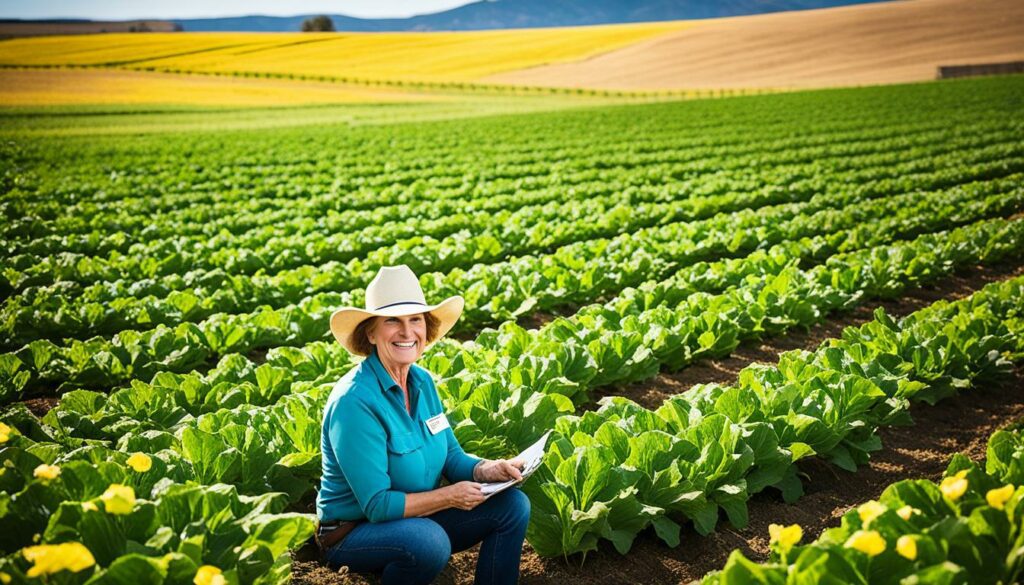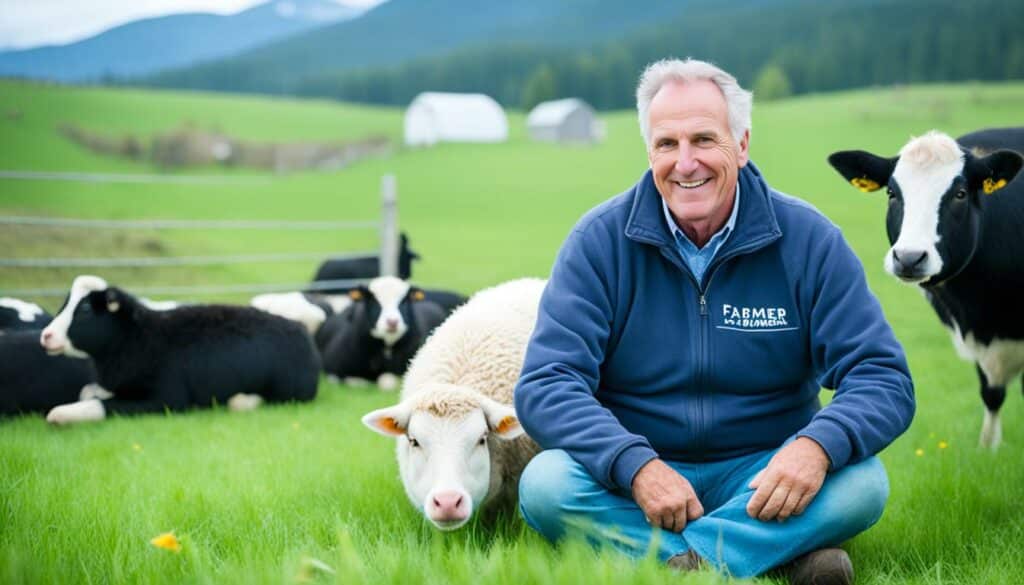Menu

Did you know that in 2016, the male suicide rate for farmers and ranchers was 43.2 per 100,000? This is much higher than the rate for all male working-aged adults, which was 27.4 per 100,000. This shows how crucial mental health help is for those in farming and ranching.
Farming and ranching jobs come with a lot of stress. Add in economic worries and unpredictable weather, the pressure can be overwhelming. It’s harder to get mental health support in rural areas. This is a big problem because mental illness happens more in the countryside than in the city.
Our article acts as a guide for finding mental health support. It covers help from the government, states, and non-profits. We introduce groups that focus on mental health in farming and key people ready to help farmers and their families. Our aim is to provide real help and support for farmers and ranchers’ mental wellbeing.
Economic instability in farming, plus isolation and few services, lead to mental health issues among farmers. These problems cause a lot of stress and mental health challenges in rural areas.
The current situation is similar to the economic challenges of the 1980s in farming. This is due to low commodity prices, natural disasters, and big debts. There is also a lack of workers and trade disputes.
The number of suicides among male farmers and ranchers is much higher compared to other working men. In 2016, it was 43.2 deaths per 100,000 people. For others, the rate was 27.4, showing the urgent need for mental health services and stress support in rural areas.
More mental illness is found in rural places, often because it’s hard to get health help. Farm workers face more mental health risks, but we don’t know the exact rates yet. The stress from farming and physical health problems are serious, making the need for mental health services very important.
There are positive steps happening, like Georgia putting nearly $2 million towards mental health in rural areas. The UGA Extension is doing a program called “Rural Georgia: Growing Stronger”. It includes workshops and support for mental health. These efforts are a good start.
“Farming is considered one of the most stressful occupations, and those working in agriculture face exceedingly high rates of death from stress-related conditions.”
| Programme | Investment | Focus Area |
|---|---|---|
| DBHDD Mental Health Crisis | $2 million | Rural Mental Health |
| DBHDD Education for Faith Leaders | $317,000 | Mental Health Crisis Management |
| UGA Cooperative Extension | $460,000+ | Farmer Stress & Education |
| UGA Extension Grant | $2.2 million | Rural Stress Work |
Efforts to tackle this issue are extremely important. With action from both public and private groups, we can fight the mental health crisis in farming communities.
It’s important to spot mental health signs early in farming. Those in farming often face unique stresses. These include money problems and not having enough workers. Spotting these signs quickly helps get farmers the right help sooner.
Farmers might show they’re stressed or anxious in different ways. They could be more easily annoyed, get frequent headaches, and find it hard to sleep. Challenges such as low prices or natural disasters can make things worse. Knowing and understanding these symptoms is really important. They can affect how well farmers do their day-to-day tasks.
Seeing these signs more clearly highlights the need for support and counselling for farmers. These issues could get in the way of their work and home life.
Depression is a big concern for farmers. It might show up as constant sadness, feeling tired, and not enjoying things they used to. Back in 2016, the suicide rate for male farmers was much higher than for people in other jobs. This shows why early help is very critical. Key signs of depression include:
Getting the right mental health support is crucial for farmers. People in the countryside are more likely to face mental health issues, so they need special help.
offers good help for farmers dealing with these issues.
| Factors Influencing Mental Health in Farmers | Potential Consequences |
|---|---|
| Economic instability (e.g., falling commodity prices) | Increased stress and anxiety |
| Natural disasters | Chronic headaches and depression |
| Social isolation | Heightened risk of suicide |
Farmers and ranchers are more aware of their mental health needs. Mental health hotlines for farmers are caring lifelines when times are tough. A study shows farmers have a higher risk of suicide. For example, in 2016, 43.2 out of every 100,000 male farmers died by suicide. This rate is much higher than in other jobs. Stress and related illnesses like heart problems are common. This shows the urgent need for mental health help.
The National Suicide Prevention Lifeline is a key support for farmers facing tough moments. It helps non-stop at 988, offering instant emotional help. Such support can be life-saving when needed the most.

Available 24/7, this lifeline is for anyone dealing with stress, anxiety, or thoughts of self-harm. It’s been even more important due to tough economic times and the pandemic. It’s there to support farmers and others in need.
The Farm Aid Hotline gives support on weekdays. It offers counselling and links to mental health help for farmers. But it does more than that. It also guides people to support and advocacy services. It has a list of over 750 groups helping with farming issues.
Here’s a look at how male farmers’ suicide rates compare to other jobs. This data shows why mental health help is so urgent:
| Occupational Group | Suicide Rate (per 100,000) |
|---|---|
| Farmers and Ranchers | 43.2 |
| All Male Working-Aged Adults | 27.4 |
With support from mental health hotlines and the Farm Aid Hotline, we can make a big difference. We aim to offer quick help and encourage a mental health-friendly environment in farming.
Farmers in the United States face different issues based on their region. The Farm and Ranch Stress Assistance Network (FRSAN) helps by offering support that fits each area’s needs. This network plays a key part in supporting farmers’ mental health across the country.
The FRSAN has set up hubs in various regions. These include the West, South, North Central, and Northeast of the country. Each hub has its own way of helping with farm stress and preventing suicides. They offer hotlines, training, and support groups.
In addition to regional support, each state also has its own help for farmers. They offer hotlines for mental health emergencies, linking farmers to specialist help. These hotlines are important for tackling the many pressures farming brings, such as economic issues and natural disasters.
By using these local and state-specific resources, farmers can get the mental health support that they need. This tailored support aims to improve their well-being and lower the suicide risk within the farming community.
In the agricultural sector, mental health has become a major issue. In 2016, the suicide rate was 43.2 per 100,000 for male farmers and ranchers. This is much higher than the rate for all male workers, at 27.4 per 100,000. Farming and related jobs can lead to anxiety, depression, and stress-related health issues.
Depression is a leading mental health problem among farm workers in the United States. Anxiety is also common and can affect how people interact with others and go about their day. A study in 2018 found that people in farming had a higher chance of suicide, underlining the need for mental health support.

There are now many therapy for agricultural professionals and counselling for farmers services. For example, the AgriStress Helpline in Connecticut offers a free 24/7 support service. It shows how important mental health support is in farming. Purdue University’s resources for farmers also focus on mental well-being.
Modern help like the Crisis Text Line (you can text CT to 741741) plays a big role. It connects people to experts who can help. FarmResponse Training helps healthcare workers better understand the mental health needs of farm workers and their families.
It’s not just the farmers who are affected. Family members face stress too. Support lines like the Talk It Out Line help parents and caregivers talk about this stress. Plus, organisations like the CT Farm Bureau and the New CT Farmers bring farmers together. They support each other, showing how important community support is.
| Resource | Description |
|---|---|
| AgriStress Helpline | Free, confidential 24/7 crisis and support line for agricultural specialists. |
| Crisis Text Line | Text CT to 741741 to reach crisis counsellors. |
| Purdue University Extension | Provides health and well-being resources for today’s farmers. |
| FarmResponse Training | Training for healthcare professionals to support the mental health of agricultural workers. |
| Talk It Out Line | Line for parents and caregivers to discuss stress impacts on family. |
| CT Farm Bureau | Peer-to-peer networking resource promoting collaboration among farmers. |
Robust support networks and community organisations are vital for farmer mental health. They provide key platforms to boost mental well-being in farming areas. These spaces tackle the special issues that farmers and ranchers face.
The Farmer Resource Network by Farm Aid is a shining light. It links farmers to much-needed resources and support for mental health. It also advises on how to handle financial worries and the feeling of being cut off.
AgWell is a crucial support system for those in agriculture. It offers training and specific community programmes. AgWell shows the need for all-encompassing mental health help in farming areas.
Community organisations, like the Nebraska Rural Response Hotline and the Stigma-Free Society, are making a big difference. They stand against the stigma of mental health struggles. This effort encourages a more open and supportive culture in rural communities.
| Organisation | Year Established | Main Focus |
|---|---|---|
| Farm Aid’s Farmer Resource Network | 1985 | Providing financial and emotional support to farmers |
| AgWell | 2020 | Mental health training and support |
| Nebraska Rural Response Hotline | – | Mental health and financial counselling |
| Stigma-Free Society | 2013 | Reducing mental health stigma in rural communities |
Rural areas are facing big challenges in mental health. To tackle this, they are using new technology more. These tech solutions help bridge the gap, giving people easier access to help. In places where there are few health professionals, this is even more important.

Apps and online counselling are really helping. They are especially crucial for rural farming areas. They provide a private, direct way to get mental health help. And, they save the trouble of long trips to see someone in person.
This is vital because mental health issues are common in rural places. Farmers face a lot, like lower prices for what they sell, natural disasters, and rising debts. So, having easy-to-use tech for mental health is a lifesaver for them.
Virtual therapy also means connecting with others in similar situations. This helps people not feel so alone. With virtual support groups, rural folks can share stories and get strength together. This is very important as isolation has worsened during the pandemic and tough economic times. Plus, it helps fight against high suicide rates in farming.
These online tools are important because there aren’t enough local mental health providers in rural areas. As tech gets better, it will do more to meet the mental health needs of farmers and ranchers. This way, they can get the care and comfort they need.
In farming, mental health issues are a big deal. Men in farming have a high suicide rate. This is much higher than males in other jobs. It shows that farmers need help to deal with the stresses in their lives. They need to focus on both preventing stress and caring for their mental health.
Being a farmer can harm your mental and physical health. Health problems like heart disease are common. It’s important to find ways to lower stress. The Farm Stress Training can help. It teaches good ways to talk about how you feel. This can help reduce the shame sometimes felt when facing mental health issues.
Farmers must take care of themselves. This means eating well and staying active. They should also check in on their mental health regularly. Depression and anxiety are common in the countryside. Encouraging self-care can make a big difference. Sites like Togetherall offer support anytime, anywhere.
It’s vital to spot stress early. Look for changes in how someone acts. Also, notice if they’re not caring for their animals as usual. Resources from Michigan State and Farm Aid can help. They offer everything from legal advice to support for farmers who need it most. This support, combined with self-care, can help farmers be stronger and healthier.
The farming sector is struggling with a silent crisis in farming. This issue is worsened by the stigma from society. In 2016, the suicide rate among farmers and ranchers was 43.2 per 100,000 males. This is much higher than the 27.4 per 100,000 for male working-aged adults in all jobs. The need to fight reducing mental health stigma in farming is clear.
Studies show that mental illness is more common in the countryside than in cities. This is partly because there are not enough mental health professionals in rural areas. People in farming are more at risk of stress, depression, and anxiety. With the highest rate of suicide in the U.S., it’s crucial to raise agricultural mental health awareness.

Several things lead to poor mental health in farming. These include being alone, getting older, and facing financial burdens. The lack of mental health services in remote areas makes it hard for farm families to get help. We must work to end the stigma around mental health in farming.
By promoting agricultural mental health awareness, we can help farmers ask for help without fear. It’s vital for farmers to know that mental health issues are normal. They are signs that you need to take care of yourself.
“Overcoming the stigma surrounding mental health in agriculture is a critical step towards ensuring the well-being of our farmers and ranchers. By fostering an open dialogue and providing accessible resources, we can support those who feed the nation.”
We must challenge false beliefs and teach the community about mental health’s importance. Talks about COVID-19’s effects on rural mental health show that there are big obstacles to getting help. It’s clear we must act. This will help bring an end to the silent crisis in farming and make a better future for agricultural workers.
| Occupation | Suicide Rate (per 100,000 males) |
|---|---|
| Farmers and Ranchers | 43.2 |
| All Occupations | 27.4 |
Farm Crisis Centres are vital for helping farmers when they’re under a lot of stress or feeling uncertain. They offer Farm Crisis Center support that’s very important. This support gives farmers and ranchers the help they need to deal with the mental health challenges of their hard work.
The National Farmers Union’s Farm Crisis Center offers a wide range of help from national and local organisations. Research shows that people who work in farming often face mental health issues. The Farm Crisis Center gives specialised support to these people, meeting their unique needs.
The American Farm Bureau Federation launched the Farm State of Mind to help farmers with mental health. Since mental health issues are common in rural areas, this effort is crucial. It provides learning tools and support groups to help farmers and ranchers deal with stress, depression, and anxiety.
They work to make talking about mental health normal and to make sure farmers know they’re not alone. This is to create a supportive community among those working in agriculture.
| Organisation | Support Provided | Key Services |
|---|---|---|
| National Farmers Union’s Farm Crisis Center | Farm Crisis Center support | Directory of resources, stress management, and crisis intervention |
| American Farm Bureau Federation’s Farm State of Mind | Farm State of Mind initiatives | Educational resources, support networks, mental health destigmatisation |
Farmers and ranchers often face hard times that affect their mental health. Having helplines and hotlines just for them is really important. It means they can get help quickly when they’re going through tough times.

The AgriStress HelpLine is always open to help farmers and ranchers. This service is there for people 24/7. It connects them with counsellors who get the struggles they face. Missouri sees a lot of childhood hunger and farmers have many challenges. So, this helpline is a big help. If they’re worried about money, the weather, or their own mental health, they can call for support.
The Avera Hotline also provides help. It’s for anyone who works in agriculture and feels stressed, anxious, or down. It offers a quick way to get support. Because The suicide rate of adult males in Missouri is high, quick mental health help like this is vital.
The AgriStress HelpLine and the Avera Farm Stress Hotline are key tools in helping farmers’ mental health. The fact that they keep everything private encourages more people to ask for help. This helps make the farming community stronger and healthier.
“Having quick and always available support for mental health in agriculture is a game-changer. The AgriStress HelpLine and Avera Farm Hotline provide a lifeline for those who find it hard to speak up.” – Expert in Rural Mental Health
For anyone in farming who needs urgent mental health help, these helplines are there to offer hope and support.
Two groups are making a big difference in farmer mental health. They’ve been key in fighting the rising mental health issues among farmers.
| Organisation | Purpose | Key Activities |
|---|---|---|
| The Do More Ag Foundation | Mental health advocacy | Workshops, Resource Development, Community Outreach |
| Rural Opioid Technical Assistance (ROTA) | Addressing opioid crisis | Training, Resource Sharing, Community Support |
Rural Opioid Technical Assistance (ROTA) focuses on the opioid crisis in rural areas. They know mental health and substance abuse are linked. So, they train and help others have the skills to fight these problems. They work in many states to make local plans against drug misuse and to improve mental health services for farmers.
The Do More Ag Foundation and ROTA are changing mental health help for farmers. They are breaking down walls and making vital mental health help easier to get in the farming community.
Educational resources are key in dealing with mental health in farming communities. Farming family mental health education is crucial. It helps promote resilience and understanding within these groups.

Programs and workshops for farmers and their families are vital. They gain essential skills to handle stress and mental issues. Farmer mental health training teaches why self-care is important and how to spot mental health problems early.
These courses also use practical activities. This helps relate the learning to the daily struggles farm life presents.
Young people in farming areas face unique challenges. Special resources for their agricultural wellness are therefore essential. These resources include educational materials, support groups, and workshops.
The goal is to create a supportive space for young farmers. This will help them flourish mentally and emotionally. It’s important for the future strength of farming.
Suicide prevention is urgent in farming, particularly with high rates seen among male farmers. It is critical to spot the signs of suicide early. This can help save lives.
It’s vital to note if a farmer is under severe stress or showing signs of depression. Anxiety and thoughts of suicide are also concerning. In 2016, male farmers faced a suicide rate of 43.2 per 100,000, much higher than the national rate. This shows the importance of mental health in farming areas.
Knowing how to help is key. The 988 Suicide and Farm Aid hotlines provide instant emotional support. These resources are available for farmers facing high stress or anxiety.
The National Farmers Union and the American Farm Bureau also offer help. They connect farmers with important mental health resources.
The National Suicide Prevention Lifeline provides free and confidential emotional support 24/7 at 1-800-273-TALK (8255).
Initiatives like the 988 Suicide and Crisis Lifeline are crucial in supporting farming communities. They provide essential help during daily high-stress situations.
| Resource | Contact | Availability |
|---|---|---|
| National Suicide Prevention Lifeline | 1-800-273-TALK (8255) | 24/7 |
| 988 Suicide & Crisis Lifeline | 988 | 24/7 |
| Farm Aid Hotline | 1-800-FARM-AID | 9am-10pm ET, M-F |
Podcasts are making a big impact by sharing mental health success stories within the farming community. They use digital stories to offer support and understanding. This helps to inspire hope and resilience. Two great podcasts are the AgWellness Podcast and the Cultivating Resilience Podcast.

The AgWellness Podcast looks at the mental health challenges and wins in farming. It creates a space for farmers to share their stories and insights. This builds a community and understanding. Listeners learn coping strategies, how to manage stress, and keep mentally well in farming life.
The Cultivating Resilience Podcast has open talks and expert tips on mental health in rural areas. It helps its listeners with tools and strategies to deal with farming’s ups and downs. By talking about resilience, it encourages listeners to improve their mental health. It also points out the importance of money and smart farm management.
These podcasts shed light on many mental health success stories, bringing comfort and encouragement. Listening, you realise others share your struggles. This shared experience can give you strength.
Farmers and ranchers need help with their mental health urgently. In 2016, the male suicide rate was 43.2 per 100,000 for farmers. This was higher than the rate for all male adults, which was 27.4 per 100,000. The agricultural sector is facing a serious mental health crisis. Stress-related conditions like heart disease and high blood pressure are also very common.
Unfortunately, mental illness is more common in rural areas than in cities. However, there are fewer mental health professionals in these places. This lack of support makes dealing with stress, depression, anxiety, and thoughts of suicide even harder. So, it’s essential to offer farmers complete mental health help.
Research shows that people working on farms have higher suicide rates than others. This fact highlights the urgent need for mental health care specifically for farmers. By supporting programmes and offering easy-to-use resources, we can make a big difference.
Making sure farmers have the right mental health support is crucial. This involves creating more awareness and better mental health services in rural areas. Everyone in farming communities should be able to access care. By supporting each other and investing in mental health, we can help the agricultural sector thrive.
To get help, farmers can call two important lines. The National Suicide Prevention Lifeline is always open at 988. There’s also the Farm Aid Hotline at 800-FARM-AID.
Economic instability, like falling prices and more debts, can cause stress and anxiety. These lead to mental health problems for many farmers.
Being far from others and lacking health services makes getting support hard. This isolation makes life tougher and worsens mental health.
Farmers and ranchers might get easily upset, have headaches, or find it hard to sleep. They could also show signs of depression like constant sadness, tiredness, and loss of joy.
Different parts of the US have specific help for farmers. FRSAN and state programs offer special mental health and crisis support in various regions.
Yes, there are services that understand the needs of farmers. They offer the right counselling and support to deal with stress.
Farm Aid and AgWell lead strong emotional and social support for farmers. Their networks help many in the farming communities.
Apps, online counselling, and virtual groups are helping. These tools offer quick and useful help, even if you live far away from services.
Farmers can cope with stress by taking care of both their minds and bodies. It’s key to have personal practices that help keep life in balance.
To end the stigma, people are working to make help-seeking normal and raise awareness. This change aims to break myths and negative views.
Centers like the National Farmers Union’s and the American Farm Bureau’s offer vital support. They help farmers in crisis with tools and support.
Helplines like AgriStress and Avera’s Farm Hotline are there for farmers anytime. They offer private, dedicated help for mental health.
The Do More Ag Foundation and ROTA are leading the charge. They focus on making mental health care better and more available for farmers.
Yes, there are many resources to learn about mental health. From training to youth programs, these help build skills and understanding in the farming community.
It’s vital to spot the signals, like big changes or hopelessness, and to act. Preventing suicides means actively caring for struggling farmers.
Podcasts like AgWellness and Cultivating Resilience tell stories of success and offer advice. They bring hope and strength to farmers.